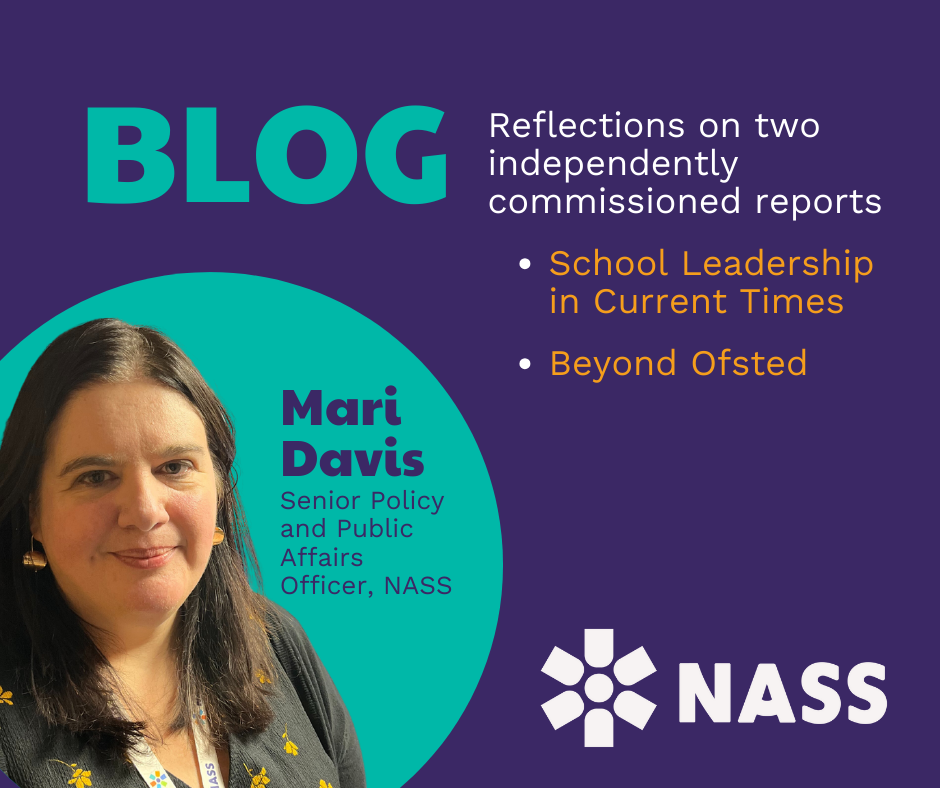 BLOG: Mari Davis, NASS Senior Policy and Public Affairs Officer, reflects on two independent reports published by Beyond Ofsted and the National Education Union (NEU) this week that raise concerns for leadership in schools and make proposals for transformational change to school inspections.
BLOG: Mari Davis, NASS Senior Policy and Public Affairs Officer, reflects on two independent reports published by Beyond Ofsted and the National Education Union (NEU) this week that raise concerns for leadership in schools and make proposals for transformational change to school inspections.
It has been a week of heavy scrutiny for Ofsted and the school inspection process. Whilst the purpose of School Leadership In Current Times and Beyond Ofsted reports are different, they are inextricably linked - and they both make for important reading for policy and decision makers.
The School Leadership survey set out to examine how leaders feel about their jobs and how school leadership can be best supported and developed. The findings truly paint a troubling picture of the working lives of school leaders in the UK.
The widespread negative impact on mental health felt by leaders and their uncertainty about continuing in their jobs in the face of this, adds to the weight of evidence we have seen, most recently in Education Support’s 2023 Teacher Wellbeing Index. The findings reinforce the challenges we know exist in retaining and developing future leaders in special schools.
The survey revealed a glimmer of optimism, perhaps, for leaders in special schools, who reported more positive experiences than those in state-funded mainstream schools.
Learning from a community of colleagues
School leaders stressed the importance of support and guidance from other professionals with experience of school leadership, along with learning from peers in other schools.
This is something we have heard from our NASS members. You have told us that having networks like our Special Interest Groups and our Leadership Programmes deliver a huge amount of value. For example, this year we had four separate leadership-related programmes running. As well as the third School Improvement Partner Training programme (run by The Mulberry Bush Organisation), we also supported the third cohort of education Leadership Programme with Caboodle Education. New for this year was a social care Leadership Programme with Dialogue and a Nurturing New Heads programme, run by The Mulberry Bush Organisation.
Beyond Ofsted and other inspection regimes
The Beyond Ofsted report is the final report of an independent inquiry commissioned by NEU a year ago and chaired by Lord Jim Knight. It provides an independent look at the future of school inspections. It urges the need for transformational change and for finding a better solution for assessing and monitoring school performance.
In summary, it calls for a system that builds trust with parents and teachers, delivers improvement across all schools and is independent of Government. It states that Ofsted should have no direct contact with schools, which should instead conduct ‘self evaluation’.
The School Leadership report identifies inspection regimes as an enduring source of intense pressure on teachers’ and leaders’ wellbeing. Whilst our members’ experience of Ofsted is general positive, we know how varied these experiences can be. We know that it’s the process rather than the outcome that is often the main source of frustration. We also have heard that leaders are often frustrated with the lack of understanding shown by some Inspectors around the specific characteristics of the school and the SEND needs of its learners.
However, for special schools it is not just Ofsted that causes increased pressure. School leaders have been sharing with us the impact and additional burden that comes from ever more demanding local authority quality assurance (QA) visits.
Given that all of our schools work with multiple different local authorities, with some schools reaching high double figures, this is something that needs to be addressed urgently.
We need to have open and transparent discussions around how we can recalibrate the focus monitoring the quality of school provision. We want to see a shift in the balance from time spent on onerous inspection regimes towards allowing schools and leaders to focus their efforts on delivering the best outcomes for their pupils.